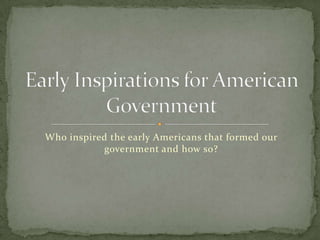
Early inspirations for american government
- 1. Who inspired the early Americans that formed our government and how so? Early Inspirations for American Government
- 2. Ancient Greece: What was ancient democracy?
- 3. What influenced Greece? Dominated by mountains, valleys & small plains Small communities due to little arable soil Difficult to communicate Had to sail to colonize, trade. So…Athens could develop its own unique democracy!
- 4. With so many independent states within Greece, what did they have in common? A common language A common heritage of myths The worship of the gods. Important because, Athens thought all of the Greeks should “share” its democracy!
- 5. Athenian democracy… Lasted about 140 to 200 years Helped inspire Colonial America. Had flaws that America's founding fathers would take into account. Democracy comes from demos meaning "people" and kratos meaning "rule."
- 6. How did democracy develop? Draco and wealthy nobility used harsh punishments to control people. After Draco’s death, Salon… Abolished enslavement of Athenian citizens. Created an assembly where all free, native born males over 18 could vote on all of the laws. Got rid of severe punishments
- 7. Created 10 artificial tribes. Each tribe chose 50 members to serve in the Council of 500. The Council made an agenda for the assembly. 10 generals were chosen by lot to be executives. Dangerous members of society could be ostracized (voted into exile) Later, Clisthenes…
- 8. Wealthy and powerful still controlled society by making passionate speeches and swaying the emotional, uneducated masses. Athens waged a successful war with all the Greeks against Persia. Democracy gave Athenians a patriotic sense of arrogance and designed a system to advance their own interests at the expense of other Greeks. Sparta and other city-states fought Athens, which would not concede and was destroyed. Democracy failed and was weak due to…
- 9. Roman Republic: What is the difference between democracy and republic?
- 11. Formation of the Republic Removed cruel kings, so they did not want a monarchy anymore. Conquered Ertuscans and had too much land and people. Used representative government to make laws… Since democracy would be to inefficient. Small group of people chosen and elected made laws.
- 12. Senate: Comes from sense(means old men). 300 patricians (wealthy) who serve for life(eventually reform brought other types of people). Power resided there through debate. American Senate is made up of older, wealthier citizens and their lengthy debate can hold up laws.
- 13. Assemblies: Citizens voted by tribes (districts of the city) Elected officers Tribunes power of veto over law. Two consuls ruled at once over the Senate and as Commanders-in-Chief of the military. Assemblies Exist for soldiers, the poor and other groups of people Which in turn made laws for themselves Had their own place in the lawmaking process for the entire city.
- 14. E. Modern ideals of campaigning came from Roman politician Cicero… Have plenty of followers Call everyone by name (so they think you care) Make promises, never say no (so they don’t get mad) Campaign in all parts of Rome (so everyone thinks their important)
- 16. What caused the republic to fail? As Rome conquered more territory, more salves were acquired. Slaves “took” the work of the poor. A larger military was needed, so privileges and benefits were given to new soldiers. The poor and military gave their support to whoever offered them the most gain. Julius Caesar did so, briefly seizing control until his assassination in the Senate. His grand-nephew and adopted son, Octavian (Augustus), stepped into his place and became the first “Caesar” or emperor. The Senate and Assemblies did not have enough power to check the rulers, nor was there a clear civilian control over the military.
- 17. English Constitutionalism: What is Constitutionalism and how did it attempt to fix the idea of a republic?
- 18. Monarchy and Constitutionalism France develops into an absolute rule, based on “divine right of kings.” Across the English Channel, King John of England isn’t allowed to bully nobles by the document, Magna Carta (1215) Advisers (Parliament) eventually are consulted to avoid tax revolt. England erupts into Civil War (1642 -1651) when Charles I dismisses Parliament for not raising taxes. Puritan Parliament declares Charles a criminal.
- 19. Constitutionalism Results… Puritan Roundheads wins over Cavaliers and Oliver Cromwell is new brutal leader. Charles I is decapitated. People decide Puritan rule is too rough. New king is brought back to rule, but powers are limited. No troops in the home. No taxing without Parliament. No secret arrests.
- 20. Eventually the English people decide the new Royals are not Protestant enough. William (Dutch) and wife Mary (English) are invited to take thrown and agree to the following: Parliament control of taxes. The right to petition the king. No standing army was to be used against the people. Protestants had the right to bear arms. Freedom of Speech and Debates. Freedom to elect members of Parliament. All future monarchs had to be Protestant. Additional Changes…